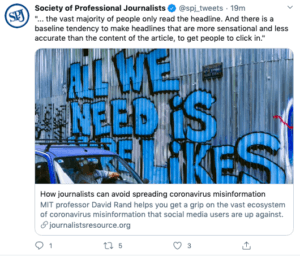 The Society of Professional Journalists links to an interview with an MIT professor who’s studying misinformation on social media (which is not the same thing as bad journalism — some bad actors take journalism out of context in order to deceive).
The Society of Professional Journalists links to an interview with an MIT professor who’s studying misinformation on social media (which is not the same thing as bad journalism — some bad actors take journalism out of context in order to deceive).
Responsible journalists are aware that sensational headlines can harm the public.
The truth is journalists in the field reporting breaking news often don’t write the headlines. Marketers will try out three or four different headlines on social media, and whichever get more clicks on social media becomes the headline for the story.
This is a challenge because people often react to the headline, without reading the actual story.
The article notes that fact-checkers often can’t keep up with the sheer volume of articles, blog posts, and tweets produced on a daily basis.
We’ll all be better off if we read the articles before sharing the link, and if we share news articles directly rather than re-sharing an outraged person’s reaction to a news story — especially when we share that person’s outrage.


